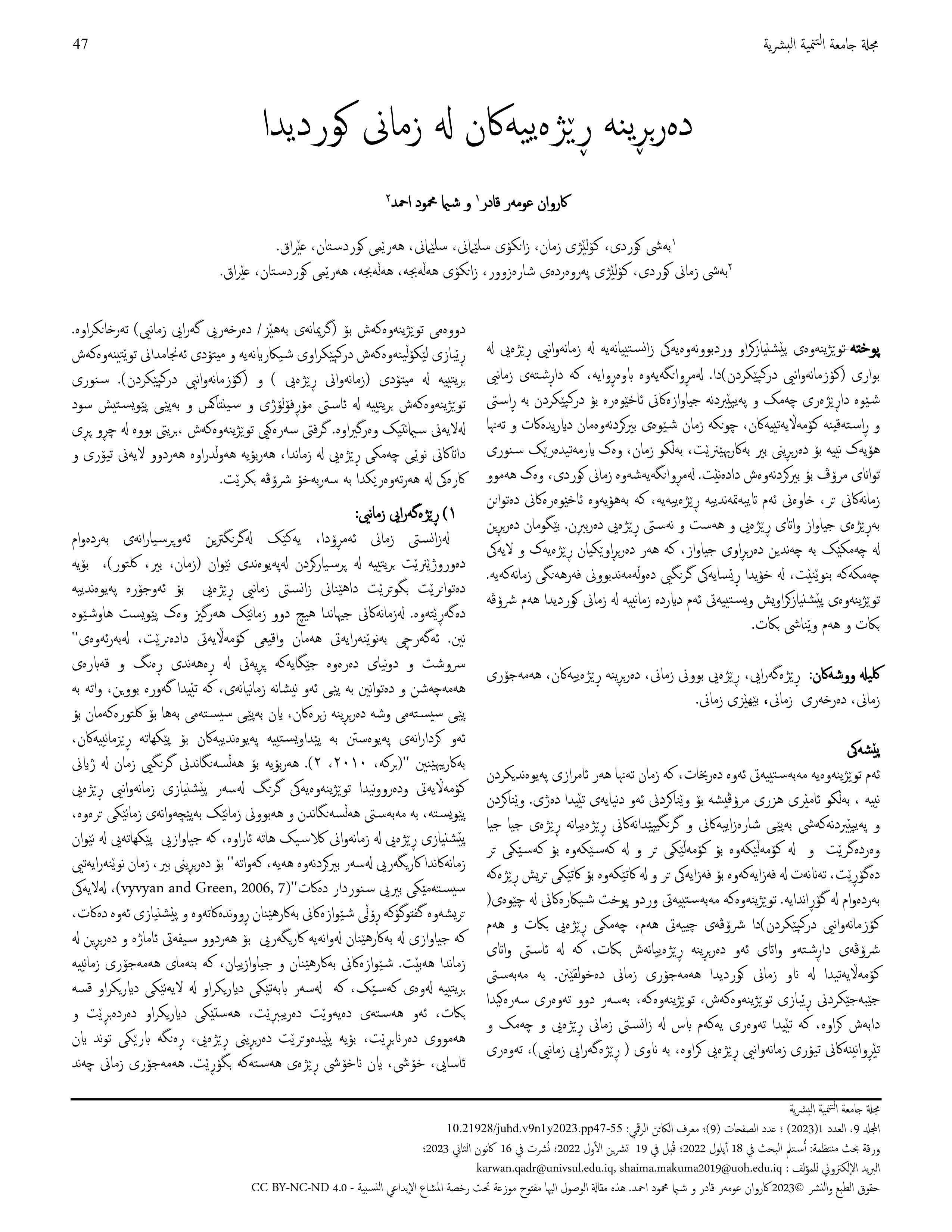Relative Expression in Kurdish Language
DOI:
https://doi.org/10.21928/juhd.v9n1y2023.pp47-55Keywords:
Relativism, Linguistic Relativity, Relative Expression , Language Variation, Linguistic Determine, linguistics WeakAbstract
The proposed research is about a scientific study of lingustic relativity expression in the field of cognitive sociolinguistics. it is believed that the composition of language and the various explorations speakers use are not only limited for communication, but language as a medium tends to show the potential with which humans can think and feel. Kurdish language, just like any other languages, possesses this relative characteristic. this way speakers can relatively express their relative thoughts and feelings. Nonetheless, uttering an expression in different ways might significantly enhance the language wich could also be a linguistic rule of languages. The proposed research aims to investigate and explore this linguistic characteristic in the Kurdish language.
References
فەتاح، محمد (٢٠١١). زمانەوانی، بڵاوکراوەی ئەکادیمیای کوردی، ژمارە(١٢٤) چاپخانەی حاجی هاشم، هەولێر، چاپی سێیەم، (١٦٣ ).
قادر، کاروان (٢٠١٢). سیستەمی درکپێکردن وەک بنەمایەکی ڕێزمانی کوردی، گۆڤاری زانکۆی سلێمانی، بەشیB، ژمارە (٣٤)، زانکۆی سلێمانی، سلێمانی، (٦).
قادر، کاروان (٢٠١٣). کاریگەری جیاوازییە زمانییەکان لە ستاندارکردنی زمانی دایکدا، گۆڤاری زانکۆی سلێمانی، بەشی B، ژمارە(40)، زانکۆی سلێمانی، سلێمانی، (١٤- ١٥).
قادر، کاروان و فەرەج، شاخەوان و مەحموود، ئاڤێستا (٢٠١٧). پەیپێبردنی فۆنۆلۆژییانە لە ناسینەوەی وشەکانی زمانی کوردیدا، گۆڤاری زانکۆی گەشەپێدانی مرۆیی، ژمارە(٤)، (٢٨٦).
قادر، کاروان و فەرەج، شاخەوان (٢٠١٢).٠فێرکردن لە نێوان ڕستەو دەقدا، کۆنفرانسی دوهەمی زانستی زمانی کوردی، هەولێر، (٦).
قادر، کاروان(٢٠١٤). درکپێکردنی زمانی ستاندارد و شیانی فێربونی زمانی دوهەم، گۆڤاری زانکۆی سلێمانی، بەشی B، ژمارە (٤٥)، (١٢- ١٣).
محمد، محمد (٢٠٠٩). جدلیە الغــة ولفکر، دار الغریب، القاهرە، (٢٣٩).
بنی عطا، احمد (٢٠٢٠). النظریة الغویة بین التراث والسدس السانی الحدیث، کلیـة العلوم الاداریة و الانسانیة، جامعة الجوف، المملکة العربیة السعودیة، حولیة کلیة الـغة العربیة بالزقازیق، ).٤٥٣، ٤٥٧- ٤٥٩).
برکة، بسام (٢٠١٠). الترجمة العربیة بین الاختلاف اللغوی و الخلاف الثقافی، الجامعة السانیة، امین عام اتحاد المترجمین العرب. )٢-٣)
Grace, Ronan (2007). Cross- Lingustic Reserch to Examine the Principle of Linguistic Relativity: Evidence From English, Mandarin and Russian, computational Linguistics, University of Dublin, Trinty College,( 5-9, 11-15).
Donnell, Niamh (2008). Lingustic Relativity and the Sapir- Worf Hypothesis. The influence of language on cognition and the implications for Second Languge Acquisition and Bilingualism, University of Dublin,( 4-5, 7).
King, Richard (2011). Linguistic Relativity and Its Potential Implications in the Field of Second Language Acquisition,( 4).
Ghosh, Sanjukta (2019). Linguistic Relativity Revisited: A Cognitive Linguistic Approach to Translation Studies, INTERNATIONAL JOURNAL OF TRANSLATION, (2-3, 5, 161).
Blackmore, Ashley (2012). REVITALISING LINGUSTIC RELATIVITY, University of Halmstad, (9).
Adekunle, Oluwakemi (2015). A Linguistic Relativity Appraisal of an African Drama: The Lion and The Jewel, Durban University of Technology, (19).
Niemeier, Susanne and Dirvin, Rene (1999). EVIDENCE FOR LINGUISTIC RELATIVITY, JOHN BENJAMINS PUBLISHING COMPANY AMSTERDAM/PHILADELPHIA,( 73).
Mills, Jon (2000). Linguistic Relativity and Linguistic Determinism: Idiom in 20th century Cornish, university of Luton,( 7).
Fantiny, Alvino (1997). Theory Reflections: Linguistic Determinism/ Relativism,( 4).
Casasanto, Daniel ( 2016). Linguistic Relativity, New York: Routledge, (161).
Lucy, John (1997). LINGGUISTIC RELATIVITY, the university of Chicago,( 292).
GUMPEREZ, JOHN, and LEVINSON, STEPHEN (1996). RETHINKING LINGUISTIC RELATIVITY, UNIVERSITY OF CAMBRIDGE. 22- Kay,p and Kempton, W (1984). ( what is sapir whorf hypothesis? )
Amrican Anthropologist,( 41).
Evans, vyvyan and Green, Melanie (2006). Cognitive Linguistics An Introduction, Edinburgh University press lrd, Graet Britain, (7).

Downloads
Published
How to Cite
Issue
Section
License
Copyright (c) 2023 Karwan Omar Qadir, Shaima Mahmood Ahmad

This work is licensed under a Creative Commons Attribution-NonCommercial-NoDerivatives 4.0 International License.


